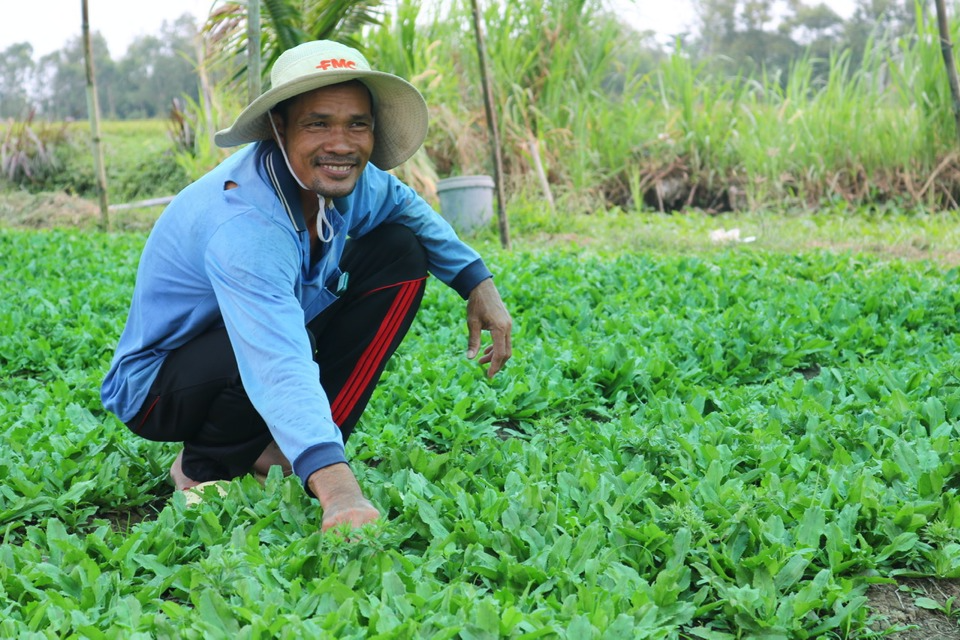Kinhtedothi – Utilizing agricultural by-products into organic fertilizer, many models of animal husbandry and vegetable growing… in Soc Trang have initially achieved many successes, contributing to building clean agriculture, safe, sustainable development.
Soc Trang is an agricultural province, the land area used for agricultural purposes is 280,384 hectares, accounting for 84.66% of the natural area, the output of waste and by-products of the agricultural industry such as straw, corn stalks, Rice husks, livestock waste, aquaculture waste… are abundant.

Organic vegetable growing model at Little Star Farm, Soc Trang city (Soc Trang). Photo: Xuan Luong
Therefore, perfecting the process of processing waste products into organic fertilizer to serve economic development activities is practical. With this production space, many farming households, units, and agricultural production enterprises have applied biotechnology to environmental treatment, fermenting food for poultry and livestock, and composting organic fertilizer. For crops, limiting the use of chemical fertilizers not only helps increase production value but also contributes to reducing environmental emissions.
Specifically, Mr. Lam Quan Van’s household (living in Ward 7, Soc Trang City) collected cow manure and straw to compost it into microbial organic fertilizer to fertilize vegetables. In 2023, he and the households growing coriander (Chinese coriander) in the area will be guided by the Southern Fruit Institute on techniques for composting organic fertilizer from agricultural by-products and waste products. As a result, good quality organic fertilizer is created, helping coriander plants grow strongly and yield high yields.

Mr. Lam Quan Van shared: “In addition to providing nutrients for vegetables, microbial organic fertilizer also has the effect of improving the soil, increasing the amount of humus in the soil, making the soil loose and not degraded. This type of fertilizer is very environmentally friendly and has little impact on human health. With this model, we can proactively source organic fertilizer regularly, reduce production costs, and limit chemical fertilizers.”
Another model in Soc Trang City also achieved much success when the owner used fish waste thanks to the conversion of microorganisms into nutrients necessary for the growth of clean vegetables.
Mr. Tran Van Ut (residing in Vinh Dong hamlet, Vinh Quoi commune, Nga Nam town, Soc Trang) shared: “During the development of the chicken flock, I use rice husks to make biological bedding, helping to keep the chickens warm. chickens, absorb waste generated during the raising process, prevent odors, and limit dangerous pathogens. When the chickens are sold, I collect all the biological bedding materials to use as crop fertilizer.”
According to Mr. Tran Van Ut, the model of raising biological bedding chickens was implemented in 2022. After seeing the economic benefits of keeping the barn clean and hygienic, it has been maintained until now. Currently in Vinh Quoi commune, there are about 50 households raising chickens using the effective biological bedding model.
Thanks to this model, Mr. Tran Van Ut raised a flock of more than 400 chickens. After 3 months, the chickens grew healthily, each weighing more than 1.6kg. The chicken flock is large, healthy, and Mr. Ut’s family’s farming area is always dry, clean, and free of odors.
Currently, Soc Trang province is implementing the “Project for Organic Agriculture Development in Soc Trang province, period 2022 – 2025 and orientation to 2030”. Accordingly, by 2025, the project will build 32 organic agricultural production model points certified to meet domestic or international organic standards, with an organic production land area of over 210 hectares.
By 2030, the area of organic production land will reach over 400 hectares, the product value per 1 hectare of certified organic land will be 1.5 – 1.8 times higher than non-organic production…
